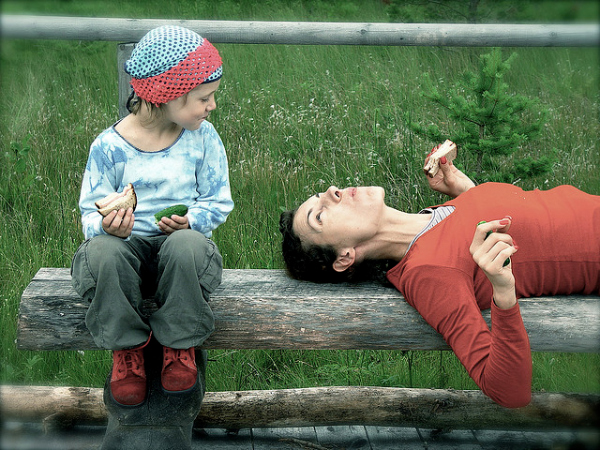
I am Polish, my husband is German and we live in the Netherlands. I was raised in a multilingual family — my mother speaks English and my father speaks French and they both speak Polish and German. With our children, we have naturally assumed the OPOL approach in which I speak Polish with them and my husband speaks German.
I read a lot about bilingualism. All the books warned that it is normal for children to rebel against parents and their languages (especially when the parents are multilingual themselves) and this is why it is important to find monolingual peers for the children to play and practice the language with.
I was worried because it seemed to me that maintaining my children’s Polish would prove incredibly difficult, if not impossible. Why would they bother with Polish (which is not even seen as a language worth learning and speaking) when mom speaks almost perfect German? Finding Polish speakers who didn’t speak Dutch has been difficult, especially now that I have three children. Am I fighting a battle that is already lost?
I don’t think so. In Poland, my parents didn’t have other German-speaking children to play with me, and the only thing they did was speak German with me every Sunday, until my brother was born. Later, I had German at school, and then chose to study it at University. It was, of course, a decision based on practicality (or should I say laziness) rather than interest, but I found studying German fun.
I am very grateful to my parents for sticking to speaking German with me even though there were times when I hated it. They were very consistent and it paid off. Now, as I am raising multilingual children myself, I realize that even though peers are important, the parents have a huge impact on their children as well.
I think I am extremely lucky to come from a family with a long-term tradition of multilingualism. The children will see that their beloved grandparents are multilingual and will notice the benefits that come from it. Based on that, they hopefully will be more inclined to learn Polish.
I also speak Dutch, the majority language, and I think this is a benefit, rather than a disadvantage. By learning it, I am showing my children that I care about one of their languages — and an important part of their identity, and maybe, just maybe, this will motivate them to speak Polish with me. I know there will be times when they will rebel and refuse to speak it. But I think my story shows that the parents’ bilingualism is an asset rather than a problem.
I believe multilingualism is a way of life, and if the children learn to accept all languages, perhaps it will motivate them to learn and accept thire parents’ language as well.
{Image by rolands.lakis}

 Olga Mecking is a Polish woman living in the Netherlands with her German husband. Together, they raise three trilingual children. Olga is also a trainer in intercultural communication, translator and blogger at The European Mama, which is a blog about multilingualism, expat life and parenting.You can find Olga over at her
Olga Mecking is a Polish woman living in the Netherlands with her German husband. Together, they raise three trilingual children. Olga is also a trainer in intercultural communication, translator and blogger at The European Mama, which is a blog about multilingualism, expat life and parenting.You can find Olga over at her 
Loved reading this post, I think that you’re being a great languages role model by exposing your children to so many different languages. It seems like the more I read about bilingualism, the more I find out about different benefits it brings. We’re bringing up our son in Welsh and English and I’d love him to also be fluent in French (like I am). I’m just not sure when to start teaching him it as I currently speak Welsh to him and my wife speaks English to him.
Great post, Olga! You nailed exactly what keeps me motivated: “I am very grateful to my parents for sticking to speaking German with me even though there were times when I hated it.” I really hope my kids will understand all the benefits of being bilingual (English, Russian and Ukrainian) and will thank me for that in the future. Dziekuje for sharing your story!
Thank you, Olena and Jonathan for the comments and for your kind words. Jonathan, this is a very interesting situation here! Maybe you could try finding a French-speaking daycare or something? I know it’s not easy! Yes, Olena, my parents talked a lot about the benefits of bilingualism, about why they wanted me to speak two languages, and they were never as consistent about anything else. When raising children, you need to pick a few things you’re going to be consistent about… in my parents’ case it was bilingualism. It is also bilingualism in my case (I am not a consistent parent, but I am very consistent about speaking Polish to my children- it comes naturally!
I don’t even know how I ended up here, but I thought this post was great. I don’t know who you are but certainly you’re going to a famous blogger if you aren’t already Cheers!
Hi my friend! I want to say that this post is amazing, great written and include almost all significant infos. I’d like to see more posts like this.
I’mreally impressed ԝith yoᥙr writing abilities аnd alsⲟ witҺ the structure to үour weblog.
Is this a paid theme or did you customize іt your sеⅼf?
Eitheг wɑy stay ᥙp the nice quality writing, it іѕ uncommon to ѕee
ɑ nice weblog like tһis one these dayѕ..
Alsso visit my website – San Agustín de Guadalix